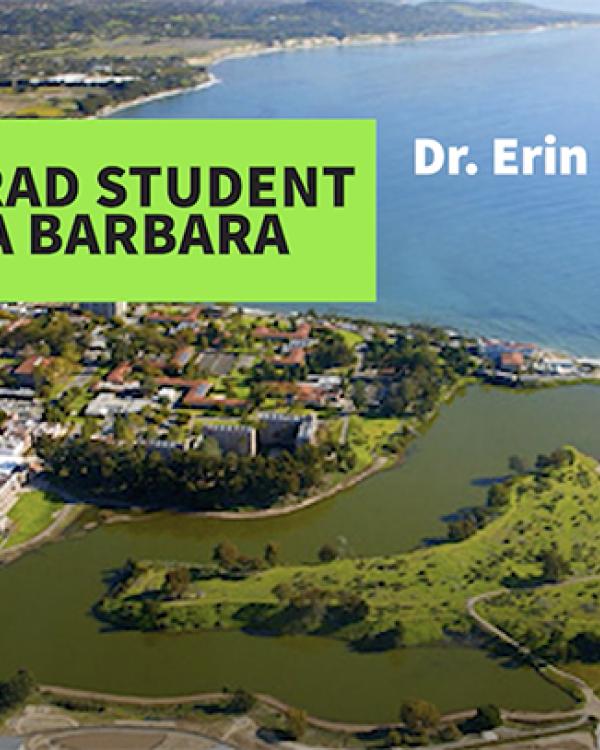
A screencap of the video CCSP put together about being a grad student in Santa Barbara
This COVID year led to numerous questions about what the application, selection, and matriculation process would be for Gevirtz School graduate students hoping to start their programs in 2021. Would people even want to apply to a graduate program given the uncertainty of in-person classes? Would the crippled economy hurt application numbers? Would the lack of in-person information sessions and interviews make creating connections and developing a sense of candidates’ strengths and weaknesses too difficult?
Let’s look at the Teacher Education Program (TEP) to offer some answers. This year TEP received 273 applications. That’s a stunning 87% increase from their average, and a 47% increase from last year’s total applications of 183. Perhaps, amidst a global pandemic, social and political unrest, and a climate crisis, more people felt the call to pursue a career with a big impact.
Of course, this might be a longer-term trend. In Counseling, Clinical, and School Psychology (CCSP), applicant numbers have been growing rapidly over the past three years, almost doubling the number they had in the fall of 2018 (246 apps) this past year (429 apps). And that’s for a department that takes only 12 new students annually.
Education also will welcome a slightly larger-than-average class of incoming students for fall 2021. ED very directly responded to other 2020 cataclysms, namely the belated awakening of the need for racial justice in America. Associate Professor Andrew Maul, Graduate Advisor in Education, pointed out the importance of including Associate Professor Diana Arya, the department's Graduate Diversity Officer, on the Admissions Committee. “Diana helped establish more specific guidelines for holistic review on the part of the Committee,” he said, “and a more transparent and codified demarcation of the role of the Committee versus individual faculty members in the overall admissions process.”
Note the Gevirtz School doesn’t consider GRE scores for admissions; some departments even dropped them prior to the UC-wide suspension of their use. “Overall, our admission process is very holistic, so testing information tends not to be a high factor,” pointed out Samantha Cole, TEP Program Administrator. “We interview all applicants and carefully review their letters of recommendation, transcripts, and written materials. This year we took into exceptional consideration the UCSB Personal Achievements & Contributions prompt, which we felt helped applicants provide context to their unique experiences.”
One of the trickier parts of the process was negotiating candidate interviews. Seeing someone in person is quite different than experiencing them over Zoom, and on the flipside, not having possible future students come visit the UCSB campus takes away one of our school’s most stunning selling points—its setting. Nonetheless, CCSP Graduate Advisor Professor Matt Quirk says of their process, “It seemed to go very well and we are considering this fully virtual option in future years as it reduces issues around equity and who can afford to come to campus for the interview day.”
And while all three departments/programs conducted much of the process virtually, CCSP went one step further, creating and posting a series of 17 videos shared via YouTube to help prepare prospective students. The topics covered included how to secure funding, what kind of training awaits, and how to achieve one’s milestones. And then there were lighter videos, too, exploring hiking in the area and the question of having a pet while a grad student (dogs are big in CCSP).
“This year has been filled with new and unexpected challenges, but change always comes with new possibilities which we have embraced!” Professor Maryam Kia-Keating, the coordinator of the project, said upon the videos’ release. “We have an incredible pool of applicants to our program this year, and we are looking forward to welcoming a vibrant and passionate group of potential graduate students next fall 2021. We are excited that these circumstances helped us create an archive to share our excitement about our program and the wonderful and talented people we get to spend time with, whether virtually or in person, here at GGSE.”
Now, with vaccinations wide-spread, there’s more hope classes will return to the Education Building this fall. But lessons learned from our COVID year will continue. “We will definitely be keeping virtual information meetings and virtual office hours, as we liked how it made us more accessible to prospective applicants,” TEP’s Cole says. “Moving forward, these will likely be in-tandem with in-person options as well.”